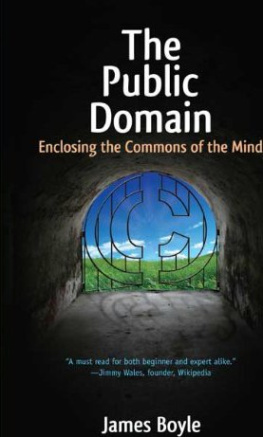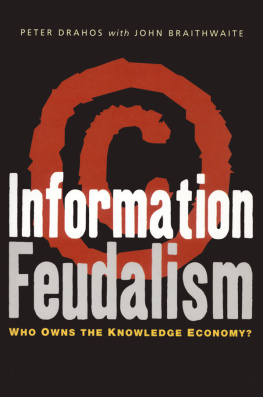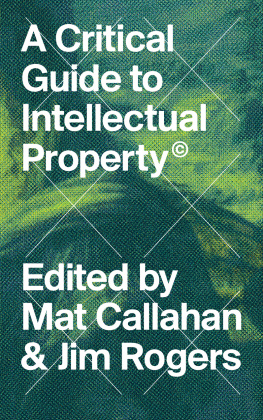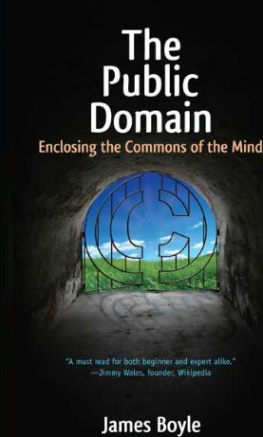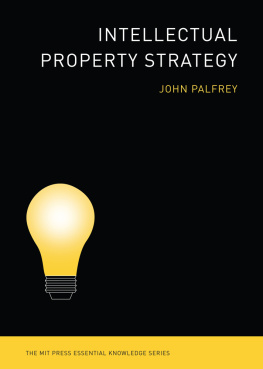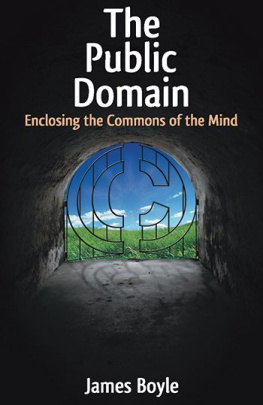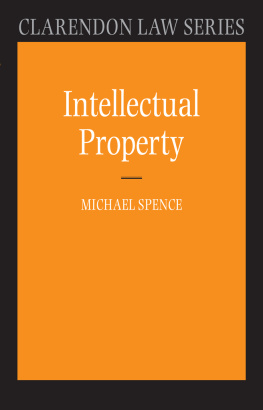The Project Gutenberg eBook, The Public Domain, by James Boyle
This eBook is for the use of anyone anywhere at no cost and withalmost no restrictions whatsoever. You may copy it, give it away orre-use it under the terms of the Project Gutenberg License includedwith this eBook or online at www.gutenberg.org
** This is a COPYRIGHTED Project Gutenberg eBook, Details Below **** Please follow the copyright guidelines in this file. **
Title: The Public Domain Enclosing the Commons of the Mind
Author: James Boyle
Release Date: December 13, 2008 [eBook #27526]
Language: English
***START OF THE PROJECT GUTENBERG EBOOK THE PUBLIC DOMAIN***
Text harvesting and reformatting by Michael S. Hart and Gregory B. Newby.
Copyright (C) 2008 by James Boyle.
The Public Domain
Enclosing the Commons of the Mind
by James Boyle
In this enlightening book James Boyle describes what he callsthe range wars of the information agetoday's heated battlesover intellectual property. Boyle argues that just as everyinformed citizen needs to know at least something about theenvironment or civil rights, every citizen should alsounderstand intellectual property law. Why? Because intellectualproperty rights mark out the ground rules of the informationsociety, and today's policies are unbalanced, unsupported byevidence, and often detrimental to cultural access, free speech,digital creativity, and scientific innovation.
Boyle identifies as a major problem the widespread failure tounderstand the importance of the public domainthe realm ofmaterial that everyone is free to use and share withoutpermission or fee. The public domain is as vital to innovationand culture as the realm of material protected by intellectualproperty rights, he asserts, and he calls for a movement akin tothe environmental movement to preserve it. With a clear analysisof issues ranging from Jefferson's philosophy of innovation tomusical sampling, synthetic biology and Internet file sharing,this timely book brings a positive new perspective to importantcultural and legal debates. If we continue to enclose the"commons of the mind," Boyle argues, we will all be the poorer.
Professor James Boyle's website: www.thepublicdomain.org
James Boyle is William Neal Reynolds Professor of Law and co-founder of the Center for the Study of the Public Domain DukeLaw School. He joined the faculty in July 2000. He has alsotaught at American University, Yale, Harvard, and the Universityof Pennsylvania Law School. He is the author of Shamans,Software and Spleens: Law and Construction of the InformationSociety and The Shakespeare Chronicles, a novel about the searchfor the true author of Shakespeare's works. He co-authored BoundBy Law, (CSPD 2006) an educational comic book on fair use indocumentary film, and is the editor of Critical Legal Studies(Dartmouth/NYU Press 1994), and Collected Papers on the PublicDomain (Duke: L&CP 2003). In 2003 he won the World TechnologyAward for Law for his work on the "intellectual ecology" of thepublic domain, and on the new "enclosure movement" thatthreatens it; (a disappointing amount of which was foretold inhis 1996 New York Times article on the subject.) ProfessorBoyle has written on legal and social theory, on issues rangingfrom political correctness to constitutional interpretation andfrom the social contract to the authorship debate in law andliterature.
For the last ten years, his work has focused on intellectualproperty. His essays include The Second Enclosure Movement, astudy of the economic rhetoric of price discrimination indigital commerce, and a Manifesto on WIPO. His shorter piecesinclude Missing the Point on Microsoft, a speech to theFederalist Society called Conservatives and IntellectualProperty, and numerous newspaper articles on law, technologyand culture. His book reviews on social theory and theenvironment, the naturalistic fallacy in environmentalism, andon competing approaches to copyright have appeared in the TimesLiterary Supplement. He currently writes as an online columnistfor the Financial Times' New Economy Policy Forum. ProfessorBoyle teaches Intellectual Property, the Constitution inCyberspace, Law and Literature, Jurisprudence and Torts. He isa Board Member of Creative Commons which is working tofacilitate the free availability of art, scholarship, andcultural materials by developing innovative, machine-readablelicenses that individuals and institutions can attach to theirwork, and of Science Commons, which aims to expand the CreativeCommons mission into the realm of scientific and technical data.He also leads the steering committee which is setting up theLearning Commons, a division of Creative Commons aimed atfacilitating access to open education resources. He is a memberof the academic advisory boards of the Electronic Privacy andInformation Center, the Connexions open-source coursewareproject, and of Public Knowledge. In 2006 he received the DukeBar Association Distinguished Teaching Award.
Yale University Press
Creative Commons License
This work is licensed under a Creative Commons Attribution
Noncommercial-Share Alike 3.0 Unported License.
This site uses CommentPress (version 1.4.1),
a project of the Institute for the Future of the Book
The Public Domain
Enclosing the Commons of the Mind
by James Boyle
Preface: Comprised of at Least Jelly?1
Each person has a different breaking point. For one of mystudents it was United States Patent number 6,004,596 for a"Sealed Crustless Sandwich." In the curiously mangled form ofEnglish that patent law produces, it was described this way:2
A sealed crustless sandwich for providing a convenientsandwich without an outer crust which can be stored for longperiods of time without a central filling from leakingoutwardly. The sandwich includes a lower bread portion, an upperbread portion, an upper filling and a lower filling between thelower and upper bread portions, a center filling sealed betweenthe upper and lower fillings, and a crimped edge along an outerperimeter of the bread portions for sealing the fillings therebetween. The upper and lower fillings are preferably comprisedof peanut butter and the center filling is comprised of at leastjelly. The center filling is prevented from radiating outwardlyinto and through the bread portions from the surrounding peanutbutter.13
"But why does this upset you?" I asked; "you've seen much worsethan this." And he had. There are patents on human genes, onauctions, on algorithms.2 The U.S. Olympic Committee has anexpansive right akin to a trademark over the word "Olympic" andwill not permit gay activists to hold a "Gay Olympic Games." TheSupreme Court sees no First Amendment problem with this.3Margaret Mitchell's estate famously tried to use copyright toprevent Gone With the Wind from being told from a slave's pointof view.4 The copyright over the words you are now reading willnot expire until seventy years after my death; the men die youngin my family, but still you will allow me to hope that thismight put it close to the year 2100. Congress periodicallyconsiders legislative proposals that would allow the ownershipof facts.5 The Digital Millennium Copyright Act gives contentproviders a whole array of legally protected digital fences toenclose their work.6 In some cases it effectively removes theprivilege of fair use. Each day brings some new Internet horrorstory about the excesses of intellectual property. Some of themare even true. The list goes on and on. (By the end of thisbook, I hope to have convinced you that this matters.) With allof this going on, this enclosure movement of the mind, thislocking up of symbols and themes and facts and genes and ideas(and eventually people), why get excited about the patenting ofa peanut butter and jelly sandwich? "I just thought that therewere limits," he said; "some things should be sacred."4
Next page
